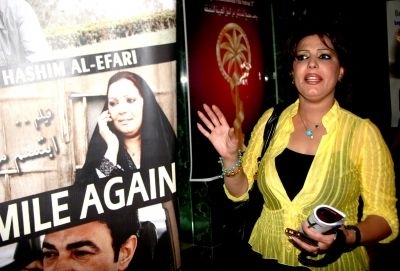Baghdad film fest aims to break cultural isolation
Amelie Herenstein
BAGHDAD, Amelie Herenstein- The Baghdad International Film Festival, which runs all this week, is the latest effort by Iraqis to use an improving but precarious security situation to break their decades-long cultural isolation.
The opening ceremony on Monday had all the glitz of a major film premiere. A huge crowd, mostly young, massed along a red carpet as ushers handed out glossy programmes at the entrance to the national theatre in the city centre.

"Culture, in Iraq or elsewhere, is like the sea without a shore -- it has no end, no barriers, it cannot be stopped," he said.
More than 150 films from 32 countries will be aired at venues across the capital over the course of the eight days of the festival, the third of its kind since the US-led invasion of 2003.
The previous edition lasted four days in December 2007, screening 63 films at the Palestine Hotel in central Baghdad. The first film festival was held in September 2005, screening 58 locally-made short films over six days at the Mansour Melia hotel, also in the city centre.
Films this year will be judged for awards in three categories -- best drama, best short film and best documentary, with two other prizes reserved for the best young Iraqi director, and the best female Arab filmmaker.
Despite Belrhali's optimism, however, the film festival faced difficulties -- it was hampered by a shortfall in funds and a lack of interest from the authorities, obstacles that go some way towards explaining why the last film festival was held four years ago.
Taher Alwan, one of the festival's directors, said that he had worked for months to put the week-long programme together.
"We contacted all the senior officials in the government and told them about the festival, but the response was very weak because no one believed we would actually organise the festival," he said.
Alwan also suggested he had been made to pay to obtain authorisation documents to hold the festival at all, a sign of Iraq's pervasive graft.
Transparency International ranks it among the four most corrupt countries in the world.
Alwan said that funding problems and question marks over Iraq's security were why no festival had been held since 2007 but voiced hope that it would soon become an annual fixture.
Despite a sharp reduction in the number of attacks since unrest peaked in 2006 and 2007, Iraq remains one of the world's most violent countries.
"I believe this festival will stimulate cultural life in Iraq, and we will try to restore the culture of cinema in Iraq," Alwan said.
"As you know, after 2003, everything was closed -- the cinemas were closed, there was no cinema activity, so Iraqis felt isolated from the world."
Film-going, like most other leisure pursuits, came to a virtual standstill in Baghdad in the years following the invasion, as families chose to stay at home and many cinemas were burned down during a brutal sectarian war.
The Iraqi film industry dates back to the 1940s and was at its most popular in the 1970s and 1980s, when going to the cinema became a weekly family outing.
However, the 1991 Gulf war and the economic sanctions that followed saw cinemas go into decline.
The turmoil that followed the 2003 invasion saw many cinemas burned down.
Alwan added that by showing their work and meeting fellow filmmakers from other countries, the festival would build confidence among young Iraqi professionals and aspiring moviemakers.
Athraa, a film student attending the first day of the festival and a member of the generation Alwan is hoping to inspire, said she had come to "watch and learn, especially regarding their use of sound and special effects."
"It is a great help for us," the 20-year-old said.
Alwan, who described himself as a screenwriter, documentary filmmaker and movie critic, said he hoped the festival would mark a "turning point" for Iraq's film industry.
"We have thousands and thousands of stories that are very suitable for cinema, but where is the system of production?" he asked.
---------------------------------------------------------------------------------